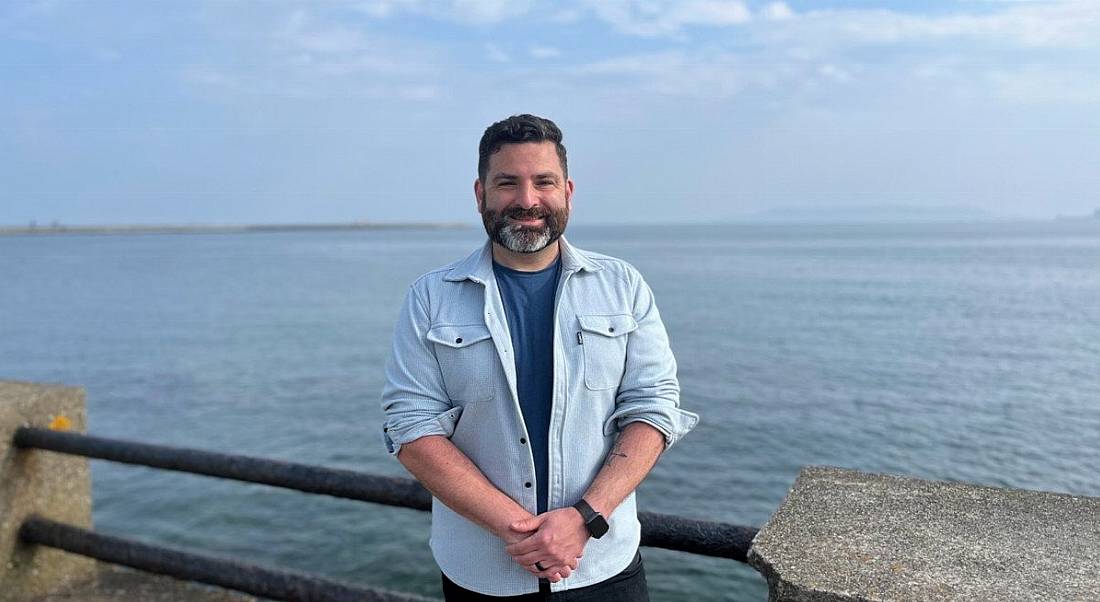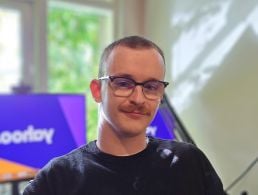Yahoo’s Roland Garza discusses his work as a software developer at Yahoo and how his military skills benefit his new career.
After Roland Garza finished school, he was unsure about what career direction he wanted to take. The “traditional academic route” didn’t resonate with him as he lacked any specific academic interests.
Growing up with family members who served in the military – including his father – Garza was inspired to join the US Air Force, where he stayed for 10 years, working on base maintenance and leading a small team on deployments as a staff sergeant.
Garza says that his time in the Air Force provided him with “invaluable experiences exploring new places, encountering diverse cultures and fostering a spirit of adventure”.
“This adventurous streak eventually led me to make the bold move across the ocean to Ireland and take up tech,” he says.
Using college credits that he earned during his military career, Garza secured a place at University College Dublin in 2018 to study computer science. During his third year, he interned at Yahoo and received a return offer once he graduated in 2022.
Now, Garza is a full-stack software developer at Yahoo, working as part of a team implementing and improving parts of Yahoo’s DSP (demand side platform), a platform where advertisers can buy space for and track their ads on media owned or operated by Yahoo.
What made you decide to pivot away from your previous work to study computer science?
STEM careers were never really on my radar. I never considered it a possibility until I had a conversation with individuals from the cybersecurity squadron. Up until then, the extent of my knowledge would have been playing computer games. However, their discussions about their work piqued my interest. Since I had no computer knowledge, their advice was to take a few courses on programming to get started. At the time, I was contemplating leaving the military and moving somewhere new anyways. So I thought, why not fully commit? So, I made the decision to pursue a degree by attending university. Given my wife and I both cherished our experiences in Ireland, I applied to several schools, ultimately securing admission to University College Dublin.
How did you go about making that move?
I consider myself incredibly fortunate to have had access to the GI Bill from my military service. This invaluable support not only covered a significant portion of my tuition fees but also assisted with housing costs while I pursued my education full time. Without this financial assistance, transitioning from the military to full-time schooling would have been a far more daunting prospect.
Moreover, my time in the military also allowed me to accumulate college credits, which proved instrumental in my acceptance into University College Dublin without needing equivalent scores from the Leaving Cert. This was a huge relief and made the transition into university even smoother. I completed a four-year degree programme, during which I had the incredible opportunity to intern at Yahoo during my third year. This experience culminated in the attainment of my undergraduate degree in computer science, marking the successful conclusion of this transformative chapter in my life.
Tell me about your journey from intern to the role you have now. What does the role of full-stack software developer entail?
During my internship, I was assigned to a team where I had the opportunity to immerse myself in real-world projects. My primary focus was on coding while simultaneously gaining insights into the company’s operations. Upon the successful completion of my internship, I was thrilled to be extended to a full-time position, which I gladly accepted. Following graduation, I returned to Yahoo to embark on this new chapter in my career.
In my role as a full-stack developer, I collaborate closely with a team, contributing to the design and implementation of innovative features. Additionally, I engage in code reviews to ensure quality and adherence to best practices. Furthermore, I am actively involved in addressing support tickets, swiftly resolving customer issues to ensure a seamless user experience.
‘Coding, in essence, is like solving a logic puzzle to address a problem’
How does working in tech differ from your previous experience?
Working at Yahoo is my first ‘office’ job. Working in the tech industry has offered me a unique perspective on the professional world. The shift to a desk-based role with a consistent schedule has opened up avenues for enjoying activities outside of work, enhancing my work-life balance significantly. I’ve found that many skills from my military service have seamlessly transitioned into my current role. The importance of teamwork, problem-solving and time management has been especially pronounced. These skills not only assist me in my day-to-day responsibilities but also encapsulate the essence of an engineer’s typical routine. Coding, in particular, feels akin to solving a complex puzzle alongside my team, where collaboration and timely execution are paramount.
What were the most challenging elements of making a career pivot into tech and how did you navigate these challenges?
Two significant challenges stand out to me. Firstly, the leap itself was daunting. Transitioning careers is no small feat, and starting afresh can be intimidating. Thankfully, I had the unwavering support of my wife, whose encouragement helped me take the leap with confidence. Moreover, the financial burden was alleviated to some extent by the benefits provided by my military service.
Secondly, returning to school as a mature student brought its own set of doubts and uncertainties. Questions about my ability to handle the workload, adapt to learning something entirely new, and whether the investment would ultimately pay off loomed large. Building strong friendships provided a support system that helped me navigate the challenges over the course of four years. Their encouragement and solidarity reaffirmed my belief that the journey was doable.
What do enjoy most about your job now and working in tech in general?
What I find most rewarding about my work is the problem-solving aspect. From a young age, I’ve always been drawn to puzzles, crosswords, and riddles – anything that challenges the mind. Coding, in essence, is like solving a logic puzzle to address a problem. You’re presented with a set of criteria and it’s up to you to devise a strategy to achieve the desired outcome. There’s a sense of satisfaction that comes with successfully implementing a solution and seeing it work seamlessly.
What advice would you give to others considering a career pivot into tech? Is there anything in particular you wish you knew starting out?
One key piece of advice I’d offer is to thoroughly research how you can turn your career pivot into a reality. Seek out conversations with individuals who have successfully made similar transitions. Everyone’s situation is different, so the path you take may differ from others. Avoid assuming that returning to school is the only option. The tech industry not only offers a multitude of career types but also pathways, and exploring these options is crucial before making a decision. You might discover that many of your current career skills are transferable, making the transition far less daunting than initially perceived. By thoroughly exploring your options it can help you confidently commit to pursuing your desired career switch.
Find out how emerging tech trends are transforming tomorrow with our new podcast, Future Human: The Series. Listen now on Spotify, on Apple or wherever you get your podcasts.




